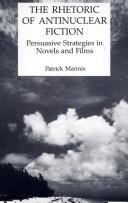Check nearby libraries
Buy this book

Given the ever-present threat of world-wide calamity that nuclear weapons present, it is not surprising that they have fascinated fiction writers and filmmakers ever since their development. Nor is it surprising that many of these artists would seek to use their work to influence mass opinion about these weapons. What may be surprising is that few studies have been made of how antinuclear fiction actually attempts to persuade its audiences.
The Rhetoric of Antinuclear Fiction is an effort to do so. Organized around the three traditional modes of rhetorical appeal--the ethical, the rational, and the emotional--the book describes and classifies the persuasive strategies of a wide range of antinuclear fiction from the period 1945 to 1989. Works examined include On the Beach, Fail-Safe, A Canticle for Leibowitz, Dr. Strangelove, The Day After, War Day, Testament, Threads, and Riddley Walker.
During the course of these studies, Patrick Mannix reveals what sorts of fictional characters have been most widely used to deliver antinuclear messages, and he follows the major arguments of the nuclear debate as they have been reflected in fiction. He also shows which emotions are invoked most often to secure the audience's opposition to nuclear weapons and how those emotions have been generated by the creators of antinuclear fiction.
The range of characters that this volume examines includes the pacifistic but loyal Air Force general of Fail-Safe, the pious but shrewd monks of A Canticle for Leibowitz, the suburban housewife of Threads, and even the computer of War-games, which teaches humanity the folly of nuclear war.
We also follow fictional manifestations of the nuclear debate from veiled arguments for world government in The Day the Earth Stood Still, through warnings of the dangers of Mutual Assured Destruction depicted by Fail-Safe, Dr. Strangelove, and Wargames, to attacks on the concepts of limited nuclear war and the Strategic Defense Initiative in War Day.
This study also demonstrates the dynamic of fear in works as diverse as Ape and Essence, The Day After, and Them!, and dissects the powerful use of scorn in Dr. Strangelove. It also shows us the paradoxical role of hope in securing the effectiveness of antinuclear fiction.
While maintaining his focus on the persuasive nature of this literature, Mannix does consider the aesthetic value of the fiction he studies, noting that the relationship between the two elements is complex and often problematical. While admitting that the aesthetic elements of some works would limit their audience and therefore reduce the scope of their rhetorical effect, he demonstrates how the skillful combination of artistic and rhetorical elements raises a film like Dr. Strangelove above the similarly themed Fail-Safe as both a persuasive act and an aesthetic artifact.
Check nearby libraries
Buy this book

Previews available in: English
Subjects
American fiction, Antinuclear movement, Antinuclear movement in literature, English language, History and criticism, Nuclear warfare and literature, Nuclear warfare in motion pictures, Peace movements, Peace movements in literature, Persuasion (Rhetoric) in literature, Rhetoric, Antikernkraftbewegung, Roman, Film, American fiction, history and criticism, 20th century, Nuclear warfare, Persuasion (rhetoric)Places
United StatesTimes
20th centuryShowing 1 featured edition. View all 1 editions?
| Edition | Availability |
|---|---|
|
1
The rhetoric of antinuclear fiction: persuasive strategies in novels and films
1992, Bucknell University Press, Associated University Presses
in English
0838752187 9780838752180
|
aaaa
Libraries near you:
WorldCat
|
Book Details
Edition Notes
Includes bibliographical references (p. 183-185) and index.
Based on the author's thesis (Ohio State University).
Classifications
The Physical Object
ID Numbers
Community Reviews (0)
Feedback?History
- Created April 1, 2008
- 9 revisions
Wikipedia citation
×CloseCopy and paste this code into your Wikipedia page. Need help?
| July 20, 2024 | Edited by MARC Bot | import existing book |
| November 17, 2022 | Edited by ImportBot | import existing book |
| November 13, 2020 | Edited by MARC Bot | import existing book |
| August 14, 2020 | Edited by ImportBot | import existing book |
| April 1, 2008 | Created by an anonymous user | Imported from Scriblio MARC record |












